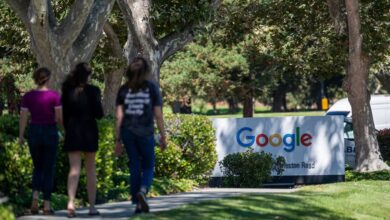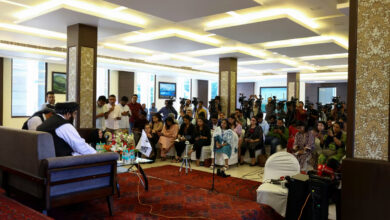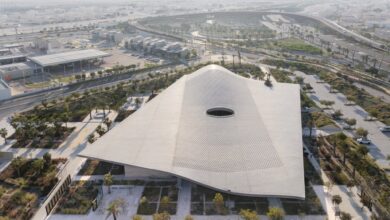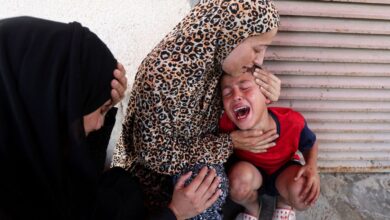“Wow, look at all those women!”
When comments of this type are heard on the streets of Cairo, it’s usually — and unfortunately — only as a brief prologue to some more blatant form of sexual harassment.
This was not the case on Saturday morning, when Mohamed Safty, 49, let out a low whistle and nudged his friend and neighbor, Ibrahim Shafik, in order to direct his attention to the long line of women forming at the gates of Amir al-Shoa’ra public school in Nasr City.
Like Safty, Shafik and the hundreds of other men crowding the sidewalk since the early morning hours, the women had gathered at the school in order to vote on the suggested amendments to the national constitution.
“I didn’t expect so many of them to show up,” Safty, clearly impressed, confesses to his friend. “But, by God, it’s a beautiful sight.”
“Just remember,” Shafik adds with a smile, “These are the type of women that say ‘no’.”
The joke — referring to the fact that most voters, male and female, seemed to be in favor of rejecting the proposed amendments — may have cracked the old neighbors up, but the reality of the situation is that, as individuals, Egyptians feel that, for the first time ever, their voices might actually count. As a result, Saturday’s turnout at Nasr City polling stations — the majority of which were located on the campuses of different public schools — was in no way limited to eligible voters.
“It’s crucial not to let this opportunity pass us by,” says Salwa Abdallah, who showed up at the Nasr City Secondary School (formerly Mubarak Secondary School) with her three daughters, the oldest of whom had just turned six. “We’ve been calling for, and demanding, our rights for our whole lives. It would be shameful not to embrace the opportunity now that we’ve been given it.”
Like many other enthusiastic voters, Abdallah brought her children with her so that they could witness “the birth of democracy.” Standing in the shade of a nearby tree, Adel Goweid also gives the same reason for bringing his 11-month-old daughter Hana to the referendum voting center. “My wife is inside, voting,” Goweid, gently rocking his sleeping daughter, nods towards the school. He explains that he offered to look after the child while his wife went in to vote first, partially because he wanted to “enjoy the atmosphere out here.”
“Look at those faces,” he says, gesturing to the long line of men a few feet away. “Everyone’s in a good mood, everyone’s optimistic. A few weeks ago, looking at these people, you wouldn’t recognize them as Egyptians.”
“I’m 50 years old, and I’ve never voted for anything in my life,” muses Hatem Mansour shortly after arriving at Rafi’aa al-Tahtawy Public School with his wife, four children and their spouses. “It’s strange, at this age, to be dealing with democracy for the first time.”
“I’m almost ashamed of the ballot box. I’ve never seen it before and on our first encounter, I have to say ‘no’.” says the 43-year-old engineer Taher Abou Kalam — another joke relating to the perceived public opinion on the amendments.
Perhaps more surprising than the overall positive mood, was the fact that it managed to survive despite the long lines, narrow public school hallways and scorching sun. Egypt is a nation (hopefully formerly) known for its infuriating bureaucracy, with official proceedings typically moving at a sluggish and usually unrewarding pace. Things, however, could not have been more different in Nasr City’s voting stations. The lines seemed to move briskly enough, in spite of the fact that many of them extended for several blocks (12, in the case of the Worker’s University polling station). Voters left the building in high spirits, eager to show off a bright pink finger covered in indelible ink to prevent double-voting.
“Before the revolution, standing in line for something like this would’ve been an absolute waste of time,” says chauffeur Karim Badr, 28, as he tries to claw the hot pink off his thumb. “The entire population could’ve stayed in bed for an election, and the National Democratic Party would have still announced a landslide victory. Now that’s all over. The people want something better and they themselves want to be better.”
“This is the first time that I’ve ever stood in line in this country without having someone try to cut ahead, or a fight breaking out,” Badr, wrapping his thumb in tissue and doing his best to ignore it, says with a smile.
“I was worried fights would break out, that things might turn violent,” admits 22-year-old Fady Selim, who had been standing in line for the past hour with his three friends. “I was also worried because people were talking about members of the Muslim Brotherhood showing up, to try to convince us to vote ‘yes’ on the amendments and that things might heat up then, but so far it’s all been great.”
True to Selim’s words, the vibe at most Nasr City voting centers seemed to be overwhelmingly positive, as even those with differing points of view chose to calmly discuss them rather than resort to anger, or violence.
Or, as Mohamed Safty puts it: “For once, opinions are divided over something other than Ahly and Zamalek — and as a lifelong soccer fan I can tell you, this is a beautiful thing.”




